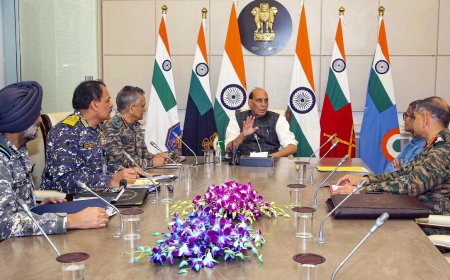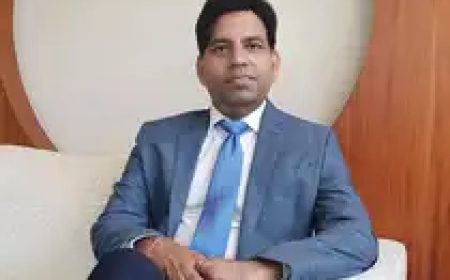Political power requires narrative power', says JNU VC at Indian knowledge systems conference
At the Indian Knowledge Systems Conference, JNU VC Prof. Santishree Pandit emphasized that political power depends on narrative control. Experts call for integrating India’s ancient wisdom into education and policy.

New Delhi, July 10, 2025 – The Indian Knowledge Systems (IKS) Conference, hosted in the national capital this week, witnessed a powerful intellectual discourse on the intersection of politics, culture, and knowledge. One of the most resonant voices was that of Prof. Santishree Dhulipudi Pandit, Vice-Chancellor of Jawaharlal Nehru University (JNU), who asserted that “political power requires narrative power”, underscoring the pivotal role of cultural and civilizational storytelling in shaping national identity and political strength.
Reclaiming the Intellectual Narrative
Addressing a gathering of scholars, policymakers, and academicians at the event organized by the Ministry of Education in collaboration with IKS Division of AICTE, Prof. Pandit argued that the decolonization of the Indian mind and educational content is not only necessary for intellectual liberation but for political sovereignty as well.
“For far too long, the Indian education system has remained captive to Eurocentric thought processes. True Atmanirbharta (self-reliance) must begin with the revival and integration of indigenous knowledge systems into mainstream academia,” said Prof. Pandit.
She emphasized that without commanding the narrative space—through media, education, and public discourse—no civilization can sustain lasting political authority.
Ancient Wisdom, Modern Relevance
The conference, themed “Bharatiya Knowledge Systems for a Global Future,” brought together experts in Ayurveda, Vastu Shastra, philosophy, mathematics, and linguistics, many of whom presented research linking ancient Indian wisdom with contemporary global challenges.
Dr. Nagaraj Paturi, a leading Sanskrit scholar, highlighted the practical applicability of Indian epistemology in solving current-day problems ranging from sustainable development to ethical leadership.
“Our traditional systems of knowledge offer not just historical value but solutions to real-world crises. Whether it’s Ayurveda guiding health policy or Arthashastra informing statecraft, these texts are repositories of practical genius,” Paturi stated.
Cultural Capital as Soft Power
Analysts view the conference as part of a larger national strategy to project India’s civilizational ethos as a soft power tool on the global stage. With the government investing in initiatives like IKS centres in universities and Sanskrit research institutions, India is clearly positioning its heritage not merely as a relic of the past, but as a tool for future diplomacy and innovation.
Dr. Neelam Pandey, a political analyst with the Centre for Policy Futures, noted:
“By investing in narrative sovereignty, India is doing what the West did during the Enlightenment—creating intellectual legitimacy for its worldview. This has both domestic and international implications.”
Market Implications: EdTech and Cultural Industries to Gain
While the IKS revival is intellectually motivated, its economic ramifications are already being felt. Startups in the EdTech space like Indic Academy, Bharatiya Vidya, and VedaVerse are seeing increased investor interest. These companies are creating curriculum content rooted in traditional Indian wisdom and are rapidly expanding into global markets.
Investor Kunal Roy from Dharma Capital, which recently backed a Sanskrit learning platform, explained:
“There is growing demand—especially among the diaspora—for culturally aligned education. The narrative push by institutions like JNU adds legitimacy and scale potential to this sector.”
Similarly, publishing houses and OTT platforms focusing on mythology-based storytelling and historical fiction are also witnessing a surge, creating opportunities for content creators and heritage tourism.
Academic Reforms on the Horizon
Education policy experts anticipate greater integration of IKS in the New Education Policy (NEP) curriculum rollout, especially in higher education and teacher training. The University Grants Commission (UGC) has already issued draft guidelines to include modules on Indian logic, astronomy, agriculture, and philosophy in university syllabi.
“Students will no longer study history and science purely from a Western lens. India’s own contributions—often more holistic—will be taught alongside,” said Dr. S. Raghavan, member of the NEP Curriculum Design Panel.
Investor Outlook: Long-Term Value in Knowledge-Based Industries
The alignment of cultural revivalism with educational reform signals a long-term value creation opportunity in knowledge-based sectors. Analysts suggest that investors may look beyond conventional tech and e-commerce to sectors like vernacular content, language technology, and heritage tourism.
Moreover, the emphasis on India's civilizational knowledge has strategic implications in geopolitical contexts—where narrative diplomacy plays a growing role in global alliances.
As the Indian Knowledge Systems Conference concluded, one theme stood out with clarity: Narratives are not just stories—they are instruments of power. Prof. Santishree Dhulipudi Pandit's assertion that “political power requires narrative power” reflects a new consensus emerging in academic and policymaking circles—one that seeks to reclaim and reposition India’s knowledge legacy as a core pillar of its political and economic future.
What's Your Reaction?
 Like
0
Like
0
 Dislike
0
Dislike
0
 Love
0
Love
0
 Funny
0
Funny
0
 Angry
0
Angry
0
 Sad
0
Sad
0
 Wow
0
Wow
0












































































